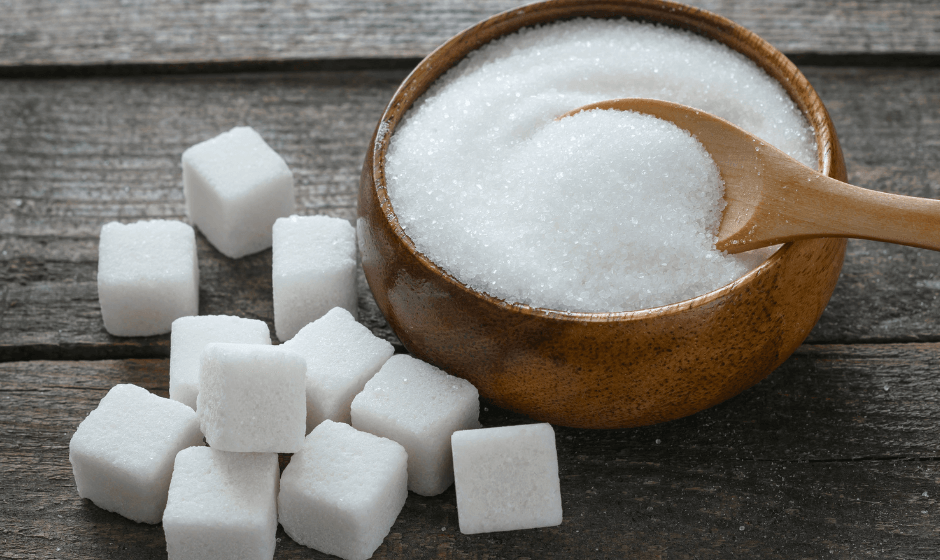
READING
IT’S TIME TO DO SOME
Top 3 Causes Why You Are Craving More Sugar


What Foods Are You Craving Today?
For sure, you can name a couple or more right now! Cravings are not just in your mind. They are real, which is why you need to figure out the causes and address them accordingly. Why? It's because frequent food cravings are one of the culprits why you're overeating, gaining too much weight, and becoming dependent on sugar.
In this article, I'll share with you the top three reasons that make you crave high sugar content foods and what you can do to crush your craving problems.
What Triggers Your Food Cravings?
There are times when you really can't help but think about eating a certain food and end up eating a lot of it until that craving is satisfied. Remember those days when you badly wanted to eat some ice cream and found yourself emptying three pints all by yourself? How about going crazy over pizza and unconsciously consuming more than six slices? Or having an emergency trip to the grocery store and filling your cart with chocolates and potato chips?
Unfortunately, we all have food craving problems, but only a few people pay attention to it and do something about it. Craving is your body's way of telling your brain that it needs something. It's an urgent message that something wrong is going on, whether it has to do with your nutritional needs, an emotional setback, biological disturbance, or hormonal problem. These can all be manifested through food cravings. However, no matter how much food you eat, it won't settle anything, as you are not addressing the main cause.
So let's discuss the main causes of your sugar cravings and find out what you can do about it.
Cause #1: Low Blood Sugar Level
One of the main causes of sugar craving is low blood sugar level, also known as hypoglycemia. This happens when you don't eat enough food that your body needs, when you skip meals, or when your food does not provide a long-lasting energy source.
Since the brain is mainly powered by sugar, it will make you crave it to increase your blood sugar level so your brain continuously receives a comfortable sugar supply. You will notice you are often thinking about wanting to eat sweet foods such as chocolate, ice cream, cake, soft drinks, energy drinks, and any other sweets. However, these are only quick fixes and will only provide a short-lived surge in energy. In other words, you will undergo the same cycle: you crave sugar, eat high sugar containing food, your sugar crashes, and then you crave again.
To help with persistent hypoglycemia, here are some tips for you:
1. Don't allow yourself to get too hungry. Extreme hunger means your blood sugar has dropped very low, and this will make you crave quick-fix foods. Always eat on time and don't skip meals, as this will help control your cravings and prevent you from binge eating or overeating.
2. Choose smart carbs. When your blood sugar is low, eat foods rich in complex and natural carbohydrates known as smart carbs, such as fruits, whole grains, peas, beans, and vegetables. These foods contain natural sugars, fiber, vitamins, and minerals. Compared to foods packed with refined sugars, smart carbs provide long-lasting energy. They will make you feel satiated for a longer time, unlike quick-fix foods that only give you short-lived energy before your sugar level crashes.
3. Give in but be in control. I'm not saying that you should eat all you want to satisfy your cravings. What I'm trying to imply is that you don't have to beat yourself up. Okay, you want to eat something; you're craving for it. Then, go ahead but be in control. You want to eat an ice cream? Don't buy a pint or half-gallon; have a scoop of ice cream instead! You're craving for cake? Then buy a single slice and not a whole cake. Does that make sense to you? It's a matter of being in control, really. Besides, the more you restrict yourself, the more your cravings will worsen.
Cause #2: Lack of Sleep
How many hours of sleep do you get each night? Ideally, you should sleep at least eight hours, right? However, with all the distractions these days, especially the temptation of browsing the Internet and socializing through social media sites, it just gets harder to complete the sleep requirement. It's even worse when you're bringing your paperwork home. Or let us say, you're a busy mother who needs to wake up early and goes to sleep late at night on a regular basis to make sure all your loved ones and the household are taken care of.
Well, it's time to change your sleeping habit. Why? It's because lack of sleep worsens your cravings by causing an imbalance between your ghrelin (hunger) and leptin (satiety) hormones. The level of your hunger hormones increases while your satiety hormones decrease, resulting in an abnormally increased appetite. As cited by Dr. Mercola, people who are sleep-deprived eat more sweet and starchy foods, and usually eat an additional 300 calories. Lack of sleep will make you crave sugar because it's the main fuel of your brain to keep you going throughout the day.
Now, what can you do to deal with cravings related to lack of sleep? The answer is sleep... not sugar! Here are some tips for you:
1. Establish a regular sleep schedule. Organize your daily tasks and make sure that they fit your schedule well without compromising your sleep. Sometimes we can't avoid disrupting our sleep schedules due to important matters. However, don't make it habitual. Finish your priority tasks for the day first. If you can't complete the miscellaneous tasks, then do them the next day. Don't overwhelm yourself. By the way, a regular sleep schedule means you need to go to sleep and wake up at a specific and same time of the day. For instance, sleep at 9 PM and then wake up at 5 AM every day.
2. Keep your bedroom exclusive for sleeping. Your bedroom is not an extension of your office. Keep your paperwork out, including your gadgets such as the laptop, tablet, or whatever has anything to do with work. Do not bring in entertainment appliances either, like your TV. It will tempt you to watch shows when you don't feel sleepy yet. In other words, your bedroom must be free from sleep distractions.
3. Avoid caffeinated food and drinks. Caffeine is really the most common stimulant that can keep you up until late night. It's the substance in your coffee and energy drink, which keeps you awake in the morning when you need to. However, it's not a good idea to take in anything caffeinated in the evening.
4. Follow a relaxing bedtime routine. A warm bath helps promote a good night's sleep because warm water has a relaxing effect on your body. Then, make sure that your bed is comfortable and your room is properly ventilated. Turning the lights off or using a dim light can also trigger your body to release more melatonin, a substance that helps you fall asleep.
Cause #3: Stress
You are stressed out in many ways. Physical stress is common when you do more physical work than your body can handle, resulting in disruption of your normal body functions. Lack of sleep, working for long hours, and any other activities that cause physical exhaustion are considered physical stress. Other incidents that wreak havoc on your body include getting sick. Being sick is stressful, isn't it?
Another form of stress that you should keep your eyes on is emotional stress. This form of stress results from anything that stirs up your emotions, be it an argument with your loved one, a painful event (death), feeling overwhelmed at work or at home, and so on.
However, how does stress contribute to your cravings? Whenever you are stressed out, the level of your stress hormones increases. This affects your body functions, your emotions, and appetite as well. Just think about a day when you were so stressed out; how did you feel on that day? Weren't you irritable, moody, and... hungry? In addition, when you're stressed out, you often end up craving for certain foods and you eat many of these foods, which you often refer to as "emotional eating."
According to the study, Mood, Food, and Obesity, food is a potent natural reward. Eating makes you feel gratification whenever you are emotional or stressed out. Giving in to your cravings increases the production of dopamine, a brain chemical that activates the reward and pleasure centers in your brain. That is why you crave a lot when you are stressed out.
You don't only crave food, but you are actually craving the rewarding and pleasurable feeling when eating. You crave the "feeling good" state. This overrides your control over satiety and hunger, which is dangerous. It will make you overeat. Instead of just eating a slice of cake, you keep telling yourself: "just one more." Then, you no longer know when to stop. The worst thing is when you are stressed out; your brain tells you to eat sweets because your brain is a sugar-eater.
Obviously, the main health issue here is actually not your cravings but being stressed out. Your craving is just the product of stress. Therefore, you need stress relief. Check the following tips:
1. Start practicing self-care. Sometimes, you are too stressed out because you forget to take care of yourself. To relieve your stress, all you need is to start prioritizing your needs. When your body needs something, for instance sufficient sleep, listen to your body and attend to your needs. Here's an article on "10 Top Self-Care Tips Every Busy Woman Needs" for you.
2. Try some relaxation techniques. There are many relaxation techniques, but you need to figure out which one fits your lifestyle and it should be something that you enjoy doing. Qigong, yoga, and meditation are popular these days. A trip to the massage spa could help a lot too. Personally, I'd love doing Qigong and grounding.
3. Use herbs for natural stress relief. Ayurvedic herbs like Organic Jatamansi, Ashwagandha, and Bhringaraja are safe and effective natural stress relievers.
Top 3 Causes Why You Are Craving More Sugar
What foods are you craving today? For sure, you can name a couple or more right now! Cravings are not just in your mind. It is real, which is why you need to figure out the causes and address them accordingly. Why? It’s because frequent food craving is one of the culprits why you’re overeating, gaining too much weight and becoming dependent on sugar.
SUBSCRIBE
Subscribe to be updated about latest news and blog posts and to follow what is happening in a magical land of Bali.

